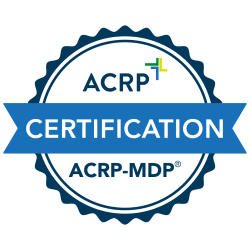Fresh from a huge and successful project putting together a COVID-19 biorepository, leaders at the Medical University of South Carolina (MUSC) shared some best practices with attendees of the first block of sessions for the ACRP 2021 virtual conference yesterday (January 12).
“Centralize communications and information as much as possible,” said Amanda Cameron, manager of the Trial Innovation Network Program at MUSC. Cameron also underlined the importance of working closely with an engaged office of general counsel, in part to protect patient privacy rights and assure doctors have appropriate access. Another tip: “Patient communications must be updated regularly.”
All told, MUSC worked with more than 160 unique subjects and drew more than 8,000 samples as part of its massive biorepository project. There were 13 investigator-led projects, including two collaborations with Clemson University.
The timeline was quick, noted Amy Gandy, laboratories manager at MUSC. Their first collections were in Charleston on April 30, 2020, with expansion discussions beginning May 4. Development of workflows and in-person training began May 18, and MUSC achieved its first remote health network collections on June 3.
Also stressing the need for centralizing efforts, Signe Denmark, associate director of Research Opportunities and Collaborations at MUSC, said it was critical to actively engage hospital compliance personnel. “Their enthusiasm [for the project] was key,” she noted.
At an earlier session, Al O. Pacino II, president and CEO of BlueCloud by HealthCarePoint, advised attendees to become more proactive when it came to addressing a slew of new privacy laws. Savvy clinical trial professionals should work to “understand modern laws and regulations that protect your personal data and privacy,” Pacino said. “Understand how to take ownership of your personal information and personal data,” he added.
For example, the General Data Protection Regulation (GDPR) and the California Consumer Privacy Act of 2018 (CCPA) (which has been technically amended by California Senate Bill 1121) both aim to guarantee strong protection for individuals regarding their personal data and apply to businesses that collect, use, or share consumer data, whether the information was obtained online or offline, Pacino noted.
Many clinical trial practitioners have a lot to learn when it comes to being in compliance with these relatively new regulatory demands, Pacino said.
Taking a look at medical data privacy conditions in Europe and the United Kingdom (UK), Lenitha Bishop, head of data protection officers at the DPO Centre in England, warned that “the cost of getting [GDPR compliance and other privacy issues] wrong continues to spiral.”
Further complicating the issue is the UK’s recent detachment from the European Union (EU), Bishop said. The UK officially stopped following EU trading rules on December 31, 2020, leaving many questions unanswered, she told attendees.
Author: Michael Causey



